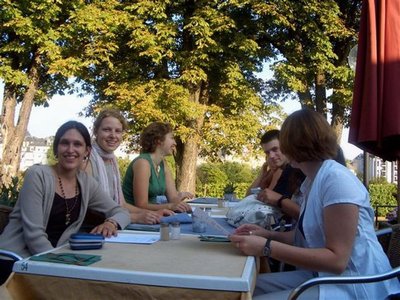November 9, 2006
European Union HQ hosts UW students
Gwen Davis
University Week Intern
The UW is known for the colorful variety of its study-abroad programs. And this past summer — with the initiation of the European Union Studies Program in Brussels — that color just got even brighter.
“The EU Studies Summer Program in Brussels is a remarkable opportunity for students to learn firsthand about the EU,” said Phil Shekleton, associate director of the Center for West European Studies at the Henry M. Jackson School of International Studies. “The program is a great way for students who are already interested in the EU to meet EU officials, and get an insider’s perspective that complements their studies at their home universities.”
The program, which ran from the July 17 to Aug. 11, recruited 13 exceptional students from the UW and seven other U.S. and Canadian colleges to participate in the study of united Europe — all students who had a high interest in the EU. “I applied to the Brussels Program because of my passion for the European Union,” said Brandon Hawkins, a UW participant. “I took most of the undergraduate classes that dealt with the EU, and wanted something that would complement my knowledge.”
Located in the political capital of the European Union, Brussels, the program was a unique opportunity. “The city was a great place to study,” said Stefan Gillette, another one of the UW participants. “Imagine having everything you are studying about within walking distance or a short bus ride away…. (Instead of) reading or talking about the functions of a DG (Directorate General) in the European Commission, why not go to the building itself and speak with one in person!”
The program featured lectures and seminars by leading experts on the EU from both sides of the Atlantic. “Professor John Keeler (the director of the Center for West European Studies at the Jackson School) was the head lecturer who taught from an academic perspective, and then there was Dr. Peter Hobbing (former principal administrator for the EU Commission) who focused on creating a comprehensive course,” said Shekleton.
The students loved the courses: “I knew before entering the program that I wanted to do graduate studies on the EU, but the program simply reinforced my passion to study the subject,” said Hawkins. “Professor Keeler was very instrumental in my decision to continue on to graduate school.”
The Center for West European Studies and the European Union Center of Excellence joined with the University of Wisconsin-Madison and the D’etudes europeennes at the Universite Libre de Bruxelles, making the program the first of its kind. “We thought there was a definite need for a program that focused on the European Union,” said Shekleton. “Everything followed from that logic.”
“I learned a lot,” said Gillete. “(I learned) the magnitude to which the European Union is now an important political and economic player on the global stage. (I learned) the complexities the European Union encounters and overcomes as it unites…(and) how powerful an ally the European Union is to the United States in terms of economic and military cooperation.”
A highlight of the program was its field trips. “The activities that were planned, such as going to Luxembourg to visit the European Central Bank, or visiting the European Parliament, are very memorable events for me,” said Hawkins. “Being in Brussels to participate in these events is like a paleontologist going back in time to study the dinosaurs when they were roaming the earth. It’s a wonderful thing to study the EU in a book, it’s quite another to be in the heart of the European Union in person.”
Participants were also enthusiastic about their peers, calling them passionate and enthusiastic about living in another country and learning a new language and culture. “Despite the fact that the program was only four weeks long, everyone clicked right away,” Hawkins said.
Gillette believes his experiences will help him with his career goals. “Having participated in this program will be beneficial to me as I continue studying public affairs, politics, and international relations in graduate school,” he said. “Depending on which career path I follow, whether international relations, or simply politics anywhere — having the knowledge gained while studying in Brussels will continue to be helpful on multiple levels.”
With all the great feedback, there are plans for expansion of the program for this coming summer: “I expect we’ll be getting a lot more applicants next year,” said Shekleton. “We’ll probably be taking 15 to 20 students… and I feel we can expand the program next year without any kind of decline in quality and personal attention.”
He said that students who are strong academic performers and have demonstrated an interest in the EU should consider applying, and that they should take courses in the European Studies Program, especially those that focus on the EU.
“I would do it again,” said Gillette of the program. “Not only did I learn more about the European Union than I could back home in the United States in such a short amount of time, but I had fun doing it.”



